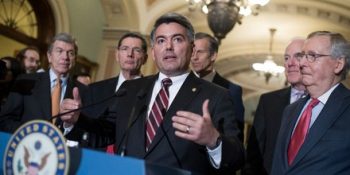WASHINGTON D.C. – Senator Cory Gardner (R-CO) spoke on the Senate floor today in support of Judge Neil Gorsuch’s confirmation to the United States Supreme Court.
(Click here to watch his full remarks.)

WASHINGTON D.C. – Senator Cory Gardner (R-CO) spoke on the Senate floor today in support of Judge Neil Gorsuch’s confirmation to the United States Supreme Court.
(Click here to watch his full remarks.)

DENVER — Today, the Senate Health and Human Services Committee unanimously approved Senator Bob Gardner’s, R-El Paso County, bill assessing a penalty for the sale, possession, adulteration, or interaction with counterfeit or misrepresentation of prescription drugs.
House Bill 17-1224 authorizes assessment of a penalty ranging from $1,000 to $10,000 for the misrepresentation of black market drugs.
While current federal law prohibits any sales and distribution of counterfeit drugs, there remain gaps in Colorado statute.
In 2017 alone, 13 criminal indictments have been filed by the FDA regarding misbranded, mislabeled or counterfeit drugs.
Black market, misbranded drugs often do not contain the same active ingredients as their FDA-approved counterparts, or may even contain toxic substitutes that can seriously harm patients who need them the most.
“There are horror stories about cancer patients receiving medications that lack the active ingredient,” said Gardner. “This is absolutely preventable. Health care professionals place themselves and the public at risk when they seek out unethical and unlicensed cost-cutting measures. We should ensure that we always look to provide the highest quality of care for Colorado patients.”
House Bill 1224 now continues on to the Committee of the Whole.

HB17-1253, sponsored by Rep. Danielson, D-Wheat Ridge, creates a reporting requirement for investment advisors and brokers who have a “reasonable belief” that someone has ripped off, or is scheming to defraud, a Coloradan over the age of 65.
Financial exploitation is the fastest-growing category of elder abuse in many states. One out of every five citizens over the age of 65 has been victimized by a financial fraud.
“We owe it to Colorado seniors, many of whom are on fixed incomes and tight budgets, to put a stop to these crimes,” Rep. Danielson said. “The generosity that came to define the ‘Greatest Generation’ is exactly what makes seniors targets for this form of elder abuse.”
Groups representing the financial planning industry, law enforcement and older Coloradans support the bill.
The vote was 36-28, with every House Republican voting against creating this barrier to unscrupulous operators trying to prey on Colorado seniors.
The bill goes to the Senate.

The House gave final approval with a 58-6 vote this morning to a bill by Reps. Faith Winter and Jeff Bridges that would make Colorado one of the first states in the nation to pass a driverless car bill.
“We know the automation revolution is coming,” said Rep. Bridges. “It is our job as elected officials to figure out how to make sure we have a strong Colorado economy and safety on our roads. This bill lays the foundation to ensure we bring jobs and innovation to our state while protecting public safety.”
“This is a law that sets a framework to encourage innovation in a growing field,” said Rep. Winter. “And this bill is particularly important because last year 605 people died on Colorado highways. There were over two million crashes and 90 percent of those were from human error. Autonomous vehicles can’t drive drunk, they can’t drive distracted, and they can’t drive when they’re tired.”
SB17-213 recognizes and defines autonomous vehicles in statute and declares that autonomous vehicles must follow the same laws as every other car on the road. It also gives clear authority to the
Colorado Department of Transportation and State Patrol to authorize testing to ensure autonomous vehicles can follow all state and federal laws.
Studies show that autonomous vehicles have the potential to decrease traffic and increase safety. They also promise to provide new mobility options for elderly and disabled Coloradans and have the potential to increase capacity on Colorado roads.
The bill now heads back to the Senate for consideration of House amendments.

This morning, the House passed a resolution, sponsored by Reps. Jessie Danielson and Dominique Jackson, recognizing Equal Pay Day, the day in the calendar that symbolizes how far into the year women must work to earn the total wages men earned in the previous year.
“In the United States, mothers are the breadwinner in half of the families with children under the age of 18, yet mothers with full-time, year-round jobs are paid just 70 cents for every dollar paid to fathers,” said Rep. Jackson, D-Aurora, citing a report by the Institute for Women’s Policy Research. “A lack of paid family leave and affordable child care, plus discrimination in compensation, recruitment and hiring all contribute to the wage gap and are all issues we need to address head on.”
As Rep. Jackson pointed out in her remarks, the wage gap is even larger for minority women. For every dollar a white male earns, Asian/Pacific Islander women earn 70 cents, African American women 64 cents, Native American women 58 cents, and Latina women only 53 cents, according to a 2017 report by the National Women’s Law Center.
“I support this resolution for my mother who raised 11 children on her wages as a janitor cleaning buildings in downtown Colorado Springs,” said Rep. Tony Exum Sr., D-Colorado Springs. “She would be very disappointed that we are still trying to get equal pay for her daughters and even her granddaughters and great-granddaughters.”
“We are bringing this resolution because we believe that people should be paid based on the quality of their work and their merit,” said Rep. Danielson, D-Wheat Ridge. “People should be compensated fairly for their hard work and the hours they put in. They should not be systematically discriminated against because they happen to be female.”
The resolution was passed by the House on a voice vote and was also sent to the Trump Administration, which just last week revoked the 2014 Fair Pay and Safe Workplaces executive order signed by President Obama to ensure that companies that receive federal contracts, and thereby taxpayer dollars, abide by certain critical labor and civil rights requirements, including a requirement on wage transparency and a ban on forced arbitration clauses for cases of sexual harassment.

WASHINGTON D.C. — Prior to President Trump’s meeting with Chinese President Xi later this week, Senators Cory Gardner (R-CO) and Brian Schatz (D-HI), along with 11 of their Senate colleagues, today sent a letter urging the President “to pursue a multifaceted and results-focused agenda that encompasses pressing security challenges; equitable economic engagement; as well as human rights and rule of law in China.” Specifically, the letter demands that President Trump ask China to take immediate action to stop North Korea and to cease its destabilizing activities in the East and South China Seas. The letter also asks President Trump to express unwavering U.S. support for Taiwan and to raise China’s behavior in cyberspace that threatens U.S. economic and national security interests.
Senators Marco Rubio (R-FL), Joe Manchin (D-WV), Mike Crapo (R-ID), James Lankford (R-OK), Todd Young (R-IN), Mike Enzi (R-WY), Orrin Hatch (R-UT), John Thune (R-SD), Roger Wicker (R-MS), Jim Inhofe (R-OK), and Dan Sullivan (R-AK) also signed the letter.
The letter reads in full:
Dear Mr. President:
As you prepare for your first summit with the President of the People’s Republic of China, Xi Jinping, we write to ask you to pursue a multifaceted and results-focused agenda that encompasses pressing security challenges; equitable economic engagement; as well as human rights and rule of law in China.
We believe that a mature, productive, and peaceful relationship with Beijing is in the national security and economic interests of the United States. While the United States can and should seek to engage China, we must be clear-eyed about Beijing’s actions and intentions, and build a long-term strategy accordingly.
As you prepare to meet with President Xi, we hope that you make it clear that China’s recent foreign and domestic policy decisions threaten to undermine the U.S.-China relationship, as well as opportunities for our two countries to advance peace and security in the Asia-Pacific region and the world. In order to strengthen the U.S.-China relationship, we recommend an agenda that addresses the following issues:
First, we believe that the most urgent challenge between our two nations is the coming nuclear crisis on the Korean peninsula. In 2016, North Korea conducted 2 nuclear tests and 24 ballistic missile launches. We believe that Kim Jong Un is committed to developing his nuclear and ballistic missile programs with one goal in mind: to develop a nuclear-capable ballistic missile that can reach Seoul, Tokyo, and most importantly, the United States.
We ask that you make clear to President Xi that the North Korea challenge can only be solved with a firm commitment from both our countries to pressure Pyongyang to stop its illicit activities. As part of our determination, we ask you to reiterate that the Administration will fully enforce the North Korea Sanctions and Policy Enhancement Act, including imposing secondary sanctions on any Chinese entities that are aiding Pyongyang. In addition, we ask you to reiterate that China must faithfully implement all U.N. Security Council resolutions with regard to North Korea, particularly Resolutions 2270 and 2321 negotiated last year, which require China to drastically reduce coal imports from North Korea. China’s record in this regard has been lackluster so far. President Xi should understand that while the United States seeks China’s cooperation, we will use every economic, diplomatic, and if necessary, military tools at our disposal to deter Pyongyang and to protect our allies.
Second, we ask you to relate to President Xi that Beijing’s escalation of tensions in the East and South China Seas are contrary to international law, increase the risk of armed conflict, threaten the global economy, and necessitate a strong U.S. and regional response.
Since 2013, according to the Department of Defense, China has reclaimed over 3,200 acres of artificial features in the South China Sea and subsequently built facilities with potential military uses on these islands, including airstrips, hangars, harbors, anti-aircraft batteries, radars, and structures that could house surface-to-air missiles.
On July 12, 2016, an international tribunal in The Hague ruled that China violated the sovereignty of the Philippines with regard to maritime disputes between the two nations and we ask you to reiterate that Beijing must unequivocally abide by this ruling.
In response to these destabilizing activities, we believe that you should enforce with President Xi that the U.S. defense posture in the South China Sea should remain exactly what then-Secretary of Defense Ashton Carter said at the Shangri-La Dialogue in Singapore on May 30, 2015: “The United States will fly, sail, and operate wherever international law allows, as U.S. forces do all over the world. America, alongside its allies and partners in the regional architecture, will not be deterred from exercising these rights — the rights of all nations.”
We also ask you to impress upon President Xi that the strong U.S. relationship with Taiwan is non-negotiable, including defensive commitments outlined in the Taiwan Relations Act as well as the Six Assurances offered by President Ronald Reagan.
Third, as the top two economies in the world, our nations are inextricably linked and we must continue to build a trade partnership that benefits U.S. companies and U.S. exporters. However, this engagement also means ensuring that China plays fair.
We ask you to reiterate to President Xi that China must stop its state-sponsored and state-endorsed theft of foreign intellectual property. According to a report by the Intellectual Property Commission, chaired by Admiral Dennis Blair and Ambassador Jon Huntsman, theft of U.S. intellectual property is estimated at over $300 billion annually—and China accounts for about 50-80 percent of that amount. China must understand that this behavior is unacceptable, antithetical to international norms, and will have serious consequences.
Fourth, we ask that you reiterate to President Xi that China’s state-sponsored or state-endorsed malicious cyber activities negatively impact U.S. businesses, U.S. national security, and our bilateral ties. We also ask that China reaffirm their intent to implement the September 2015 cyber commitments, which include combatting malicious cyber activity and hacking, and not conducting or knowingly supporting cyber-enabled theft of intellectual property for commercial gain. The United States and China should also continue efforts to develop peacetime norms for responsible state behavior in cyberspace. These norms are critical to keeping activities in cyberspace from inadvertently escalating and increasing the possibility of armed conflict.
Finally, we ask you to raise China’s deplorable human rights record. Chinese authorities are intensifying human rights abuses and are cracking down on civil society. According to the State Department’s 2015 human rights report on China: “Repression and coercion markedly increased during the year against organizations and individuals involved in civil and political rights advocacy and public interest and ethnic minority issues.” This behavior is simply unacceptable from a nation that wants to be thought of as respectable global power. We hope that you will remind President Xi that its actions on human rights are central to China’s relationship with the United States.
The U.S.-China relationship is perhaps the most consequential in the world. We believe that framing the summit around these issues will reiterate to Beijing that while the United States is committed to building a positive bilateral agenda, it cannot be built on the basis of coercion and outside of international legal norms.
We look forward to your reply and wish you a successful and productive summit.
Sincerely,

The conference, which is free and open to the public, will feature sessions from 10 a.m. to 5:30 p.m. in the Eaton Humanities building and will be hosted by the College of Media, Communication and Information’s Department of Journalism.
“In this charged political climate with journalism under fire, CU Boulder is bringing together a range of voices to discuss the way through the morass of disinformation,” said Mei-Ling McNamara, an assistant professor in journalism and organizer of the conference. “Frontline journalists, scholars, students and the public will have the chance to debate, discuss and reflect on this critical juncture in journalistic practice.”
The keynote — “In the time of Trump, where is the free press headed?” — will be a conversation between Joe Sexton, ProPublica senior editor and a 25-year veteran of The New York Times; and Elizabeth Skewes, an associate professor of journalism and media studies whose research focuses on media sociology and news practices, the media’s role in electoral politics and politics in popular culture. The session will open the conference at 10 a.m. in room 1B 50 of Eaton Humanities.
In addition, talks will include panelists from the New York Times, The Nation, The Denver Post, KGNU Community Radio, Rocky Mountain PBS and other organizations.
“For students of journalism and members of the wider community, this is a valuable opportunity to raise debate and discussion about how we got here and where we’re headed,” said McNamara.
View the full schedule and register. There is no fee to attend the conference, but registration is requested.

After years of failed partisan efforts, Rep. Tracy Kraft-Tharp’s bill to give state agencies the ability to waive penalties for small businesses for minor infractions of state regulations passed the House this morning. The vote was 41-22, with five Republicans joining every Democrat in supporting the common-sense proposal.
“Regulatory reform has been a contentious issues in the legislature for years,” said Rep. Kraft-Tharp, D-Arvada. “I’m proud to have developed a compromise with bipartisan sponsorship and support from business, labor and consumer groups.”
Under HB17-1270, also sponsored by Rep. Polly Lawrence, R-Roxborough Park, first-violation companies with 50 employees or fewer – about nine out of 10 companies in Colorado — that fail to file the appropriate paperwork, where the aggregate penalty is a fine of $500 or less, could be given 30 days to correct the lapse without penalty. State agencies could waive penalties in a variety of categories, but not in several specified categories, including those involving public safety, wage theft or violations of federal law.
The bill would also urge state agencies to improve public dissemination of rules changes and order a review of the most-violated rules to see if notification and training, or the rules themselves, should be revised.
Business groups such as the Colorado Association of Commerce and Industry, the Colorado Competitive Council and the Denver Metro Chamber testified in committee in support of moving the bill forward.
But only five House Republicans voted for the bill.
Voting against Colorado small businesses were Minority Leader Patrick Neville of Castle Rock, Assistant Minority Leader Cole Wist of Centennial and Republican Reps. Jon Becker of Fort Morgan, Perry Buck of Windsor, Terri Carver of Colorado Springs, Justin Everett of Littleton, Stephen Humphrey of Eaton, Lois Landgraf of Fountain, Tim Leonard of Evergreen, Kimmi Lewis of Kim, Larry Liston of Colorado Springs, Paul Lundeen of Monument, Hugh McKean of Loveland, Clarice Navarro of Pueblo, Dan Nordberg of Colorado Springs, Kim Ransom of Littleton, Lori Saine of Dacono, Lang Sias of Arvada, Kevin Van Winkle of Highlands Ranch, Yeulin Willett of Grand Junction, Dave Williams of Colorado Springs and Jim Wilson of Salida,
HB17-1270 goes to the Senate, where it also has bipartisan sponsorship.

|

A bill by Reps. Joe Salazar and Daneya Esgar to protect Coloradans from overreaching federal programs targeting religious or ethnic communities passed out of the House this morning with a party-line 37-28 vote.
“As this bill moves to the Senate, I hope to see my colleagues come together around this legislation that protects all communities in Colorado and simply says to the federal government, ‘If you’re asking us to do something that’s illegal and unconstitutional, we will not stand for it here in Colorado,’” said Rep. Esgar, D-Pueblo.
“This bill is about protecting states’ rights and Coloradans’ rights,” said Rep. Salazar, D-Thornton. “It’s disappointing to see my Republican colleagues vote against constitutional protections—they’re sending a message to our communities that the federal government can terrorize Coloradans.”
The Colorado Freedom Defense Act prohibits state and local governments from giving information about a Coloradan’s race, ethnicity, national origin, immigration status, or religious affiliation to the federal government unless it is for a legal and constitutional purpose.
The bill also prohibits state and local governments from working with the federal government to create or maintain any registries, identify people using physical or electronic markers, or intern or detain a person based on race, ethnicity, national origin, immigration status or religious affiliation. The bill does not prohibit law enforcement from sharing information about criminals with federal agencies.
On the floor this morning, Reps. Esgar and Salazar supported an amendment to change the name of HB17-1230 to the “Colorado Freedom Defense Act” after correspondence with a relative of the late Governor Ralph Carr who did not oppose the bill, but requested that Carr’s name not be on the bill due to the politicized nature of the debate surrounding the legislation.
The bill proceeds to the Senate with the new name.